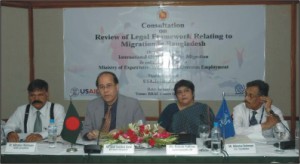Law event
Consultation on legal review
 A daylong consultation on 'Review of Legal Framework relating to Migration in Bangladesh' was organised on May 8, at BRAC Center Inn by the International Organisation for Migration (IOM) in collaboration with Ministry of Expatriates' Welfare and Overseas Employment (MoEWOE). The programme was sponsored by the USAID Bangladesh commissioned with the aim to update the existing laws and regulation to address the labour migration abuses.
A daylong consultation on 'Review of Legal Framework relating to Migration in Bangladesh' was organised on May 8, at BRAC Center Inn by the International Organisation for Migration (IOM) in collaboration with Ministry of Expatriates' Welfare and Overseas Employment (MoEWOE). The programme was sponsored by the USAID Bangladesh commissioned with the aim to update the existing laws and regulation to address the labour migration abuses.
Mr Kazi Habibul Awal, Secretary to the Ministry of Law, Justice and Parliamentary Affairs and Mr Abdul Matin Chowdhury, Secretary to the MoEWOE were the Chief Guests respectively of the programme.
Dr Mizanur Rahman, Professor of the Department of law, University of Dhaka was the key presenter in this consultation, shared the findings of his study on the legal review. The consultation included extensive group works, which came up with a comprehensive set of recommendations. It will be incorporated in the research report to be submitted to the Government by IOM.
Different sessions were moderated and facilitated by Mr Abdul Malek, Director General of the Bureau of Manpower, Employment and Training (BMET), Dr Sk. Abdur Rashid, Additional Secretary of the Ministry of Home Affairs, Mr Hazrat Ali, Additional Director General of BMET, Mr Salauddin Akbar, Deputy Secretary of the MoEWOE, Advocate Adilur Rahman Khan of the Supreme Court of Bangladesh, Mr Mizanur Rahman and Dr Uttam Kumar Das of IOM.
Ms. Rabab Fatima, Regional Representative for South Asia IOM, said that the growing number of abuses and exploitations in the labour migration processes justified that the laws and regulations are not entirely conducive to a viable migration management system in Bangladesh, therefore a legal review and modification is necessary. IOM is pleased to be collaborating with the Government in bringing about reform in the labour migration sector. She also stressed on the need for ratification of the Convention on the Rights of the Migrant Workers and Member of their Families by the Government of Bangladesh.
Mr. Abdul Matin Chowdhury, Secretary to MoEWOE said that in the absence of ratified international treaties by the labour-receiving countries and absence of bilateral agreements with them, Bangladeshi labour migrants fall victims of various forms of abuses and exploitations.
Mr. Kazi Habibul Awal, Secretary to the Ministry of Law observed that the existing laws and regulations relating to migration in Bangladesh need serious review and modification to meet the demand of the time. He asked the Ministry to take note of the recommendations emerging from the study and consultation. He further said that the developed and destination countries should also extend opportunities for peoples' safe migration and protecting rights and dignity of the migrant workers.
Both the Secretaries observed that there is a dire need for raising peoples' awareness for safe migration. This will contribute to prevent abuses in the migration processes. The Government cannot do this alone. International organisations like IOM, like such and other organisations, and civil society groups could play an important role in this regard, they said.
The program was attended by 560 participants representing the government, organisations working in the area of migration, and academic institutes.
The participants recommended for a timely, appropriate policy and legal intervention to address the labour migration issues. They observed migration has potential as a major element of the development process in Bangladesh since it can be an important sustainable livelihood strategy of the poor.
As part of the IOM programme, the MoEWOE has formed an Inter-Ministerial Committee for strengthening information collection and monitoring capacity over overseas employment and recruitment services in Bangladesh. Apart from the legal review, IOM is also undertaking three other studies including one on the complaint mechanism relating to labour migration abuses. IOM will also organize similar consultations with the members of the judiciary and Inter-Ministerial Committee on the findings of the legal review.
-Law Desk.